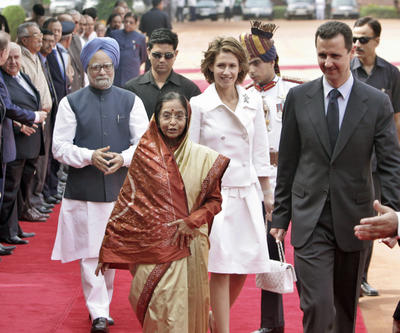The US, EU, Russia or the Arab League can engage in dialogue with Syria, but they do not enjoy the Syrian government’s confidence to spearhead a peaceful transition. This is where India’s role emerges.
The Indian model of secular and participative democracy aside, India is viewed as a time-tested friend in need to Syria because of its continued support for the Palestinian cause and return of the disputed Golan Heights to Syria. India’s stance on Iran and desire for permanent membership in the UNSC is supported by Syria. The two countries also share a 50-year-plus bilateral relationship, collaborating on the Middle East peace process and development agenda. During the current crisis the Syrian government has clearly indicated that it looks up to India to play a positive role in negotiating peace — a position now endorsed by Iran and Russia.
The Syrian government keeps in regular contact with New Delhi, seeing it as a respected stabilising power and also as a prominent member in influential forums like BRICS. The recently concluded Non-Aligned Movement meeting in Tehran also heard India’s considered views on the Syrian situation. In the event of any peace initiative at the UN level, a favourable role for India would be welcomed in Damascus.
India’s response to the Syrian crisis has been cautious but firm and unequivocal. India is wary that the volatility in Syria could have spillover effects on the neighbourhood and negatively impact its own vital interests, which include the safety and security of Indian expatriates in the Gulf, flow of remittances, energy supplies, food security, investments and projects, peaceful uses of nuclear energy, combating of maritime piracy, and the sensitivities of India’s vast Muslim community. India’s vote in favour of the UNSC resolution on Syria and disapproval of the Chinese and Russian veto marks a sharp shift from New Delhi’s earlier non-committal position on the Arab Spring.
As a resilient democracy, India is naturally empathetic to the popular upsurge in West Asia and stands by the people’s aspirations for a participative and liberal political order. But New Delhi must also watch out for subversive actors at play in this political transformation. Contrary to popular belief, neither the state nor ordinary civilians were the first to resort to violence in Syria; the targeted provocations were launched by the Salafi/Takfiri Islamist insurgents. The supporters of change, overwhelmed by the unsettling effects of the revolution, have inadvertently opened up the space for extremist agencies to pursue their narrow sectarian agendas. There are also growing apprehensions of Syrian chemical and biological weapons falling into the hands of groups like Hezbollah or Jabhat al-Nusra. India certainly is not going to overlook or underrate those potentially pernicious trends, which could have damaging consequences nearer to home unless handled resolutely.
The Syrian crisis has gone too far and the difficulties of an early disentanglement are obvious. Peace efforts starting with the UN–Arab league Special Envoy Lakhdar Brahimi last December left many loose ends. Yet a fight to the finish type scenario is not as yet warranted. The belligerent mood of the rebels has much to do with external support similar to how the Assad regime can bank upon a military and diplomatic back-up from its foreign allies. While violence goes unabated neither side is sure that it has come close to a point where the final outcome is within its easy reach – indicative that a peace initiative is in the best interests of all. The presence of all involved parties at the Geneva II conference is a must to ensure the long-term sustainability of any resolution. The lessons from past experiments in Kosovo, Iraq and Afghanistan demonstrate that a hasty regime change does not ensure a responsible government. Sectarian interests coalesce initially but later take on the character of contending power aspirants. Here, the Cambodian or the Myanmarese model could provide the framework for a feasible solution.
India has the potential to encourage a forward-looking development agenda in Syria. It can also play a defining role as a third party between the United States and Russia, facilitating a relaxation of their rigid attitudes toward Damascus, while persuading Syrian President Bashar al-Assad to declare a truce with the rebel factions as a first step. Diplomacy seldom starts with a sure success in the first round, and, given the imbroglio, an honest broker like India should be resilient in its efforts to soften the attitudes of the mentors of the warring parties. If the situation permits, this can be followed by peace talks with Assad and, depending on the efficacy of its public diplomacy, with Syria’s civil society too. India could also play a part in the national reconciliation that would need to follow, facilitating a democratic transition in good time. Apart from a proactive role in the peace talks, India’s foreign policy objectives should therefore concern collaborating with Syria to facilitate the resettlement of refugees, good governance, gender equality and freedom of the media.
Sukalpa Chakrabarti is Assistant Professor of International Relations and Public Policy at the Symbiosis School of Economics in Pune, India, and also a columnist with The Diplomatist.

